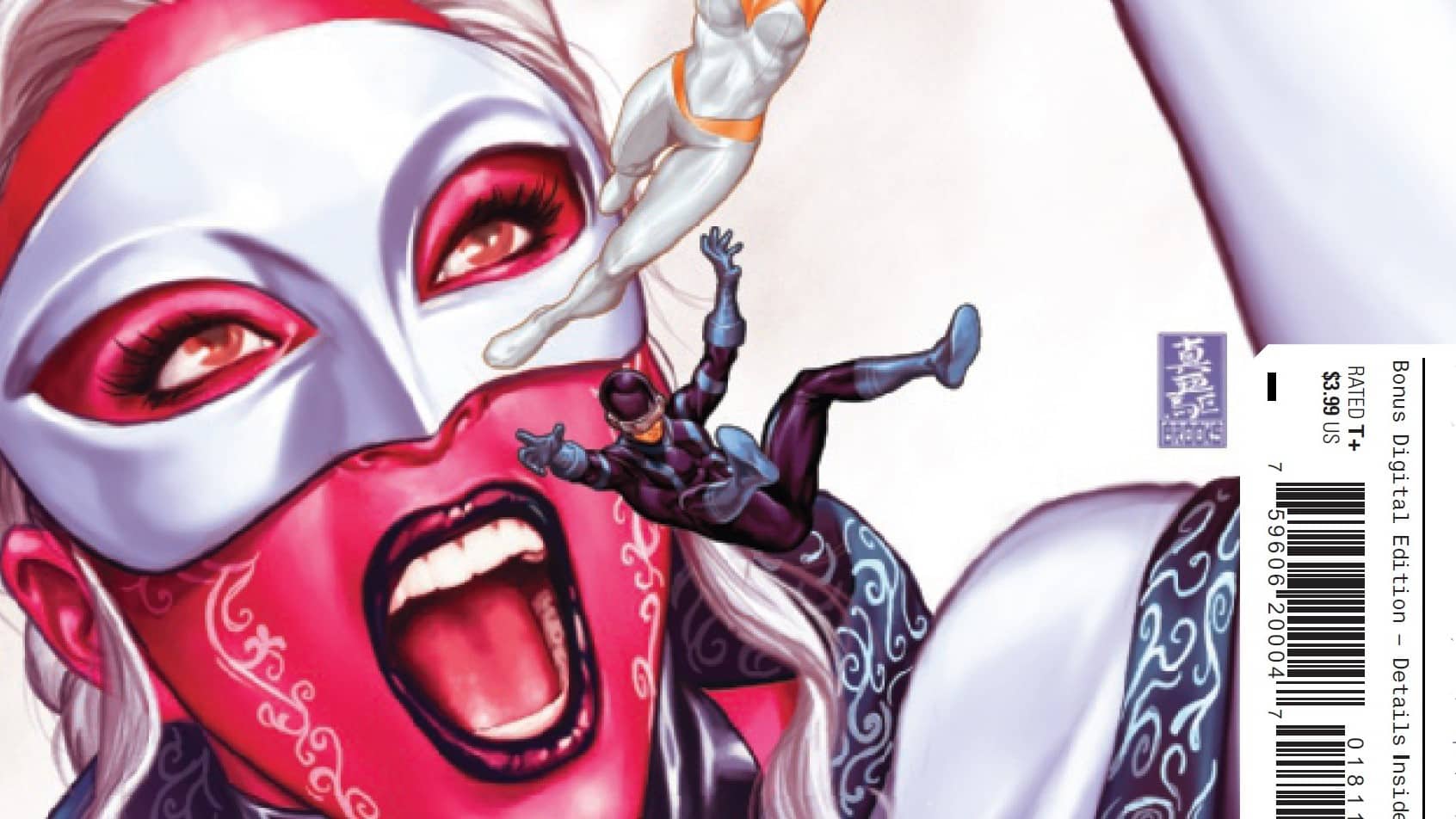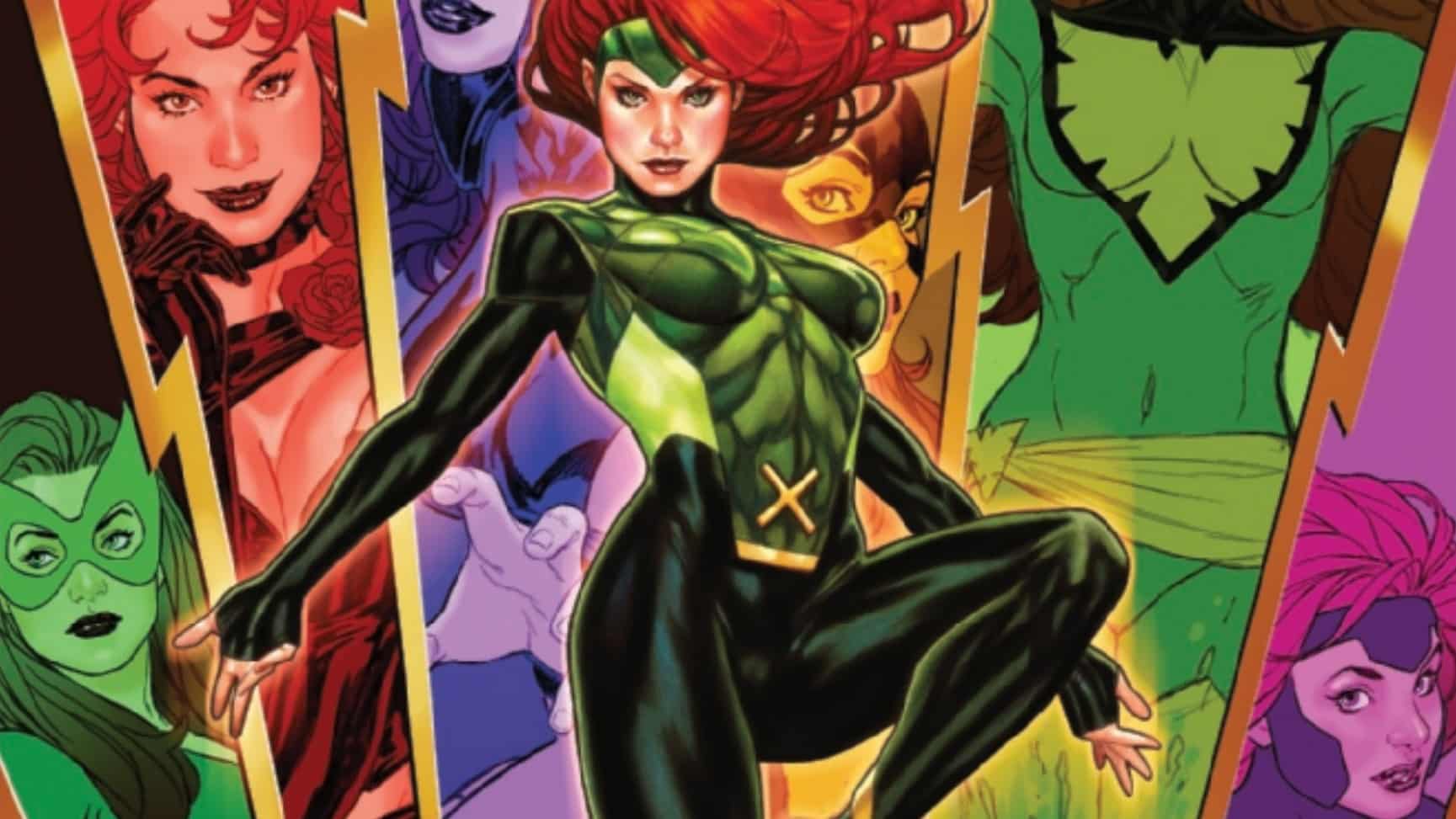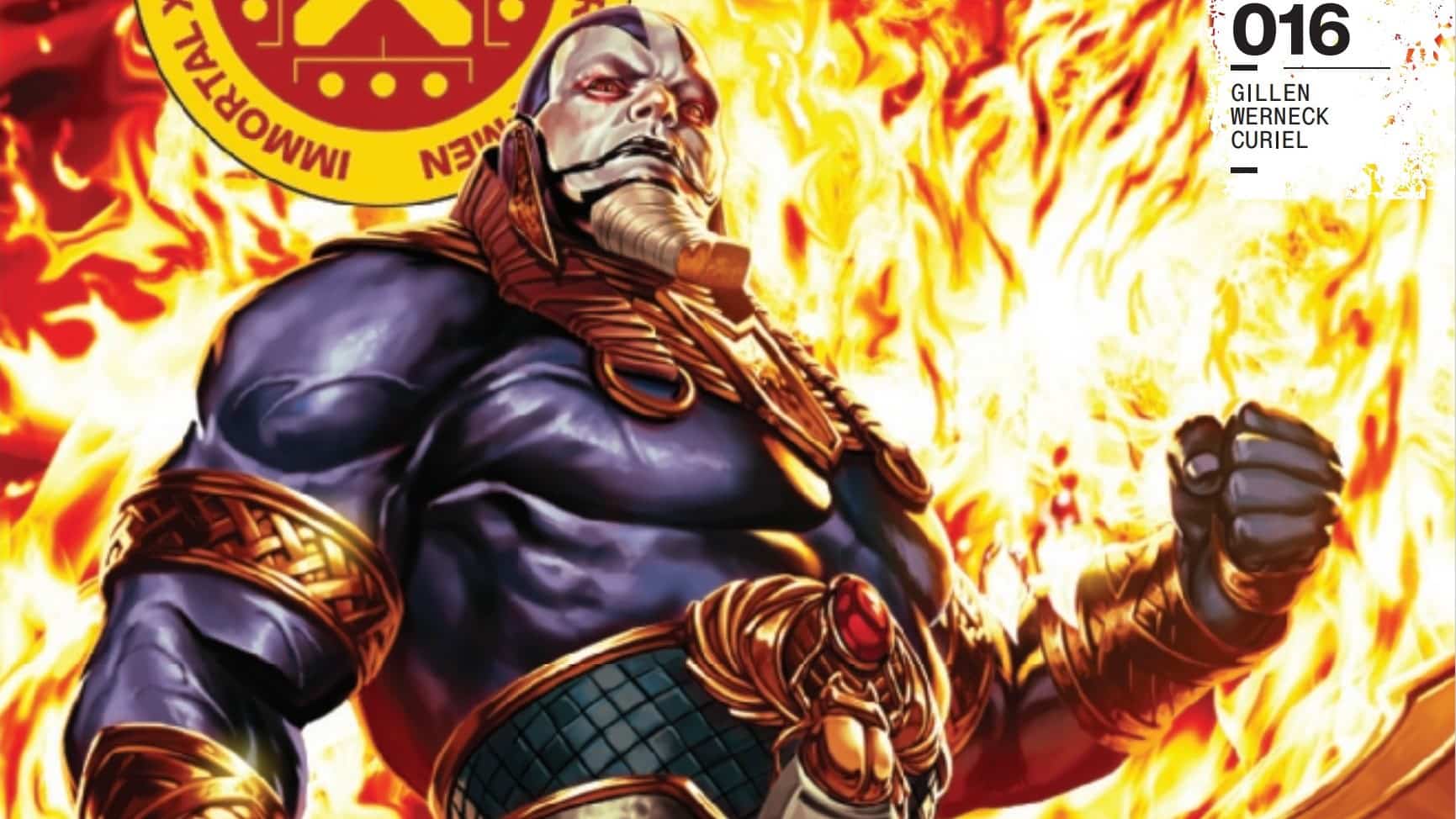In Immortal X-Men #6, Sebastian Shaw faces his past, helps Exodus through a trying time, strikes a bargain against mutantkind, faces judgment, strikes another bargain for mutantkind and comes face to face with Righteousness. Written by Kieron Gillen, drawn by Lucas Werneck, colored by David Curiel, lettered by Clayton Cowles, and designed by Tom Muller and Jay Bowen.
Mark Turetsky: Hey Austin, you ever have one of those days that just seemed to stretch on forever? Where if it’s not one thing, it’s another, and it seems like the world is on a knife’s edge, about to fall into utter chaos and destruction?
Austin Gorton: And then a demon shows up and you have to rescue your super stuffy co-worker but in doing so your best suit gets burned off you? All while the specter of a judgy space god looms overhead, threatening the existence of all humanity over one poor decision after another? Mondays, amirite?
Mark: Sometimes I wonder if Garfield doesn’t have the right idea.
Previously in Judgment Day…

Mark: So here we are, six issues into this series, two issues into this crossover event thingy, and we get our biggest confirmation of what exactly this series is about. When a comic like this shifts its perspective with each issue, among 12 different cast members, it can be tricky to keep your focus on the throughline. Thankfully, in the opening sequence of this comic, Gillen abandons the strict point-of-view storytelling he’s been using to catch us up on Sinister and Destiny (especially Destiny). And while it’s substantially a recap of what happened in Judgment Day #3, we really don’t want to miss out on Destiny’s moment of judgment by the Progenitor.
Austin: It’s that whole “recap by way of showing events from a different perspective” trick; so while Judgment Day #3 saw the mutants decide to try to kill the Progenitor (all for it to turn out to be an elaborate hallucination), in these opening pages Kieron Gillen provides a bit more context, specifically, Destiny’s manipulation of the Quiet Council vote approving the attack. I love the heavily footnoted data page breakdown and the little tidbits of plot and characterization sprinkled throughout (like Destiny’s insistence the vote needed to be held while Xavier was in the middle of being resurrected or how Hope and Exodus have basically become a voting bloc).
From there, we get Destiny’s encounter with the Progenitor, taking the form of a one-Mojo-eyed Mystique to give Destiny the big ol’ thumbs down. Not for being willing to obliterate Iceland to save the world, but for, basically, failing to live up to her potential (and being soft on Mystique).
Mark: Back in Judgment Day #3, we only really saw Captain America get the full judgment treatment. We heard, let’s say, summary judgments on a few other characters, but we didn’t get to see what they saw, or the Progenitor’s reasoning behind its judgment. It looks like that sort of thing is being saved for tie-ins like this one. It makes sense: Destiny, Frost, even Shaw are major characters in this comic, but not so much in the main event miniseries. And It’s kind of fascinating to hear the Progenitor’s reasoning. It’s not just a straight-up-and-down morality judgment. It’s also a question of living up to one’s potential, in the case of Destiny, or getting hung up on one’s past, like Emma. It’s closer to the Greek concept of Eudaimonia, literally, having the good demon. Eudaimonia is about flourishing, about living the best life one can. It’s not a cut-and-dry state of being, though, and nobody really agrees about what it means, and we don’t have Aristotle to ask.
Austin: It also, conveniently enough, allows for greater drama by putting some variables into the equation: if the Progenitor’s standards of judgment are mutable and/or varied based on each person, then we can still be surprised by how a given judgment may or may not go (like Captain America failing) or the reasoning behind it (that Destiny fails isn’t a surprise; the reasons why she fails are more so). Ultimately, this allows for a more entertaining story, and a somewhat easier-to-manage crossover, as any inconsistencies in the Progenitor’s logic from writer to writer can be considered a feature, not a bug.
Mark: And a recurring motif is not just what the judgment is, but the Progenitor appearing as the person whose judgment means the most to the person being judged. Over in X-Men, Cyclops told the Progenitor he’d only accept judgment from Jean, and the Progenitor dismissed him with a quick thumbs-up. It’s as if he beat the Progenitor at its own game.
Indestructible, Indefensible, Reprehensible Me

Mark: From the beginning, I was worried about how visually interesting this series, about a group of people who meet in a big circle, would be. Don’t get me wrong, I didn’t doubt that Werneck would be able to make it interesting, but there’s the question of how. Well, here we get Emma’s judgment at the hands (thumbs?) of her dead students from Genosha, Shaw’s flashbacks to his relationship with his father and Exodus’ quite flashy judgment.
Austin: One way or another, Werneck and Gillen have figured out how to punch up what are, essentially, scenes of pretty people sitting in a circle and taking votes. One of the things I really enjoyed here is how the art and the narration are occasionally out of sync. Coming out of the opening credits, the narrative captions are being written in the voice of Sebastian Shaw, the focal character of this issue. Yet the art, at times, is showing us things Shaw is not privy to; he wonders how the Progenitor appeared when it judged Emma, and surmises that it looks poorly on “smart people” because Emma failed. Yet we see the panel of her surrounded by her dead students, and it’s clear she failed for reasons beyond a propensity for smartly hedging her bets.
This then leads into a flashback for Shaw, as we learn he had a distant, aloof father solely concerned with the accumulation of wealth, which prompted Shaw to grow up with an insatiable desire to accumulate wealth himself, to both emulate his father and stick it to him. Of all the work Gillen has done throughout this series giving us a snapshot of each issue’s central character, this one fell the most flat to me. Shaw had a Bad Dad and that made him both hate the dad and become the dad. It’s about what you’d expect from a character like Shaw, and there’s not a lot here to invigorate or otherwise recontextualize the almost-cliché. Did this glimpse of Shaw’s past work better/differently for you?
Mark: I think that’s an incomplete picture of who Shaw is, as we see later on in the issue. He certainly considers his relationship with his father to be the formative aspect of his life, but that’s not what he’s judged for. When the Progenitor shows up in his home, he expects it to take the form of his father, because he thinks his father is the only person suitable to judge him. He’s done everything in his life to both impress and spite his father. But it’s Frost who appears to judge him. He shouts that he doesn’t respect her, that he considers her to be just as petty and greedy as him. Is it informed by his sexism? I mean, yeah, of course. But I think he also worries that Frost has actually surpassed him and that she actually has rejected his deep cynicism. Some of his first thoughts in the issue are about her, where he says it’s “quite boggling” how far she’s come. But her judgment of him is enough to leave him shouting at an empty room about how bad he is. He’s the dril corncob tweet in that moment.
Austin: I do appreciate that the Progenitor appeared as Emma, in part because it did add some complexity to Shaw, and because so much of Shaw’s role in the Krakoa era has been tied to Emma, so it makes a sort of narrative continuity sense as well.
But before Shaw faces his own judgment, he faces Exodus’ judgment, in the form of a massive Satanic demon holding Exodus’ crusading buddy, Eobar Garrington (ancestor of present day Black Knight Dane Whitman) in his clutches. The smash cut from Emma warning to be on the watch for the Progenitor’s tests as they may be subtle to Exodus’ test, which is very … not subtle, was quite amusing. Shaw seems concerned that if Exodus were to fail, it would take one of the mutants’ big guns off the table, and while that doesn’t seem to be how this all works (Emma and Destiny failed, and they’re still around), it does lead to Shaw having his expensive suit burned away as he punches the Progenitor demon back to “hell,” setting up his later declaration that he doesn’t fear hell.
Mark: The trial that Exodus faces seems different from the others we’ve seen. Is he judged worthy because he won the fight? Is it because he didn’t lose faith? Is it because his cause was so righteous that even an evil man like Shaw came to his aid? Were they even in real physical danger? Shaw’s suit getting burned away would seem to indicate that there was a real threat. But on the other hand, maybe the Progenitor wouldn’t send a threat that it knew they couldn’t handle.
Back to the scene where Shaw gets judged, he’s up to his old tricks: This time, he’s investing in anti-mutant technologies, literally giving money to Orchis. This is ultimately his trial, and he fails. The Progenitor doesn’t give a long explanation, merely saying “you are judged.” But I think the Progenitor’s appearance as Emma gives us the reason: It’s that he doesn’t live up to Emma’s standards. She’s a successful businessperson. She’s powerful, manipulative, clever. But Shaw is, ultimately, a nihilist. He’s already lost his soul, so why bother worrying about anything other than the amassment of wealth and power? He gets the thumbs down because despite all his raging that he doesn’t care, he knows deep down that Emma is a better person.
Austin: Right, he basically plays the “you can’t judge me, I know I’m going to hell, so I’m just going to enjoy my time here as much as possible” card. And while, to our earlier point, the judging standards of the Progenitor are somewhat inscrutable, it does seem like if Shaw truly believed that, he’d have passed. The fact that he doesn’t pass means he doesn’t truly accept that worldview, and the Progenitor taking the form of Emma shows why: Emma is Shaw without the nihilism, without having consigned herself to eternal damnation. For all his declarations that he’s comfortable with who is and where he’s going, he’s not.
Martini Lunches & Blood Sacrifices

Mark: I’m gonna come right out and say it, but Shaw here reads like Tony Schwartz’s writing in Trump’s The Art of the Deal. Just read this:
I don’t do it for the money. I’ve got enough, much more than I’ll ever need. I do it to do it. Deals are my art form. Other people paint beautifully on canvas or write wonderful poetry. I like making deals, preferably big deals. That’s how I get my kicks.
That can’t be a coincidence, right? And further, he gets Eros onboard by parroting Emma’s optimism. Could it be that the Progenitor came in the form of Emma to give him the idea? Remember, it’s powerful enough that it can reach backward and forward in time, it can surely be wily enough to know that it’ll inspire Shaw to say the words that Eros needs to hear in order to make the deal and subsequently turn the world into one worth saving. For all we don’t know about the Progenitor, we can’t say for sure that it cares one way or another if the Earth is good or bad, but maybe it’d prefer if the world were worth saving.
Austin: Shaw as the Trump of the mutant world does seem apt. And he definitely seems inspired by his encounter with the Progenitor. Whether this is an indication of genuine action or just him glomming onto a better angle to get to something which benefits him remains to be seen (though his thoughts suggest it truly is the former). Eros’ role as the Eternals’ dealmaker seems a little odd in terms of his past history, but this probably isn’t the place to fully unpack that (and it certainly fits in a general sense if the idea is “the Eternals need someone to be a liaison to non-Eternals, and that’s Starfox”).
From being inspired by “his” former White Queen in meeting with Eros, Shaw shifts to taking inspiration from his former Black Queen, Selene. Having learned (offscreen) that Selene’s ability to transform the External Gate into a kaiju in issue #1 came as a result of a deal she struck, Shaw, would-be Art of the Deal cover boy, reaches out to the person who made a deal with Selene: Mother Righteous.
Mark: As far as bad things going on in the world of Immortal X-Men and Judgment Day, this is definitely A Thing That’s Happening. Maybe it’s my general ambivalence toward Legion of X, but I don’t really have much to say about Mother Righteous. I’m sure she’ll end up playing a crucial role in events, probably after Judgment Day ends, but at this point it seems like one of the least urgent bad things going on. Shaw is up to no good? You don’t say. … It might be literally infernal, but it’s not quite as fun as Sinister’s secret plot.
Austin: My reaction when the issue ended on the reveal of Mother Righteous: OK, sure. And I agree: Giving Shaw something to do isn’t a bad thing, for this book or the wider X-line. But compared to the immediate threats of Judgment Day and the ongoing chess match between Destiny and Sinister, “whatever Shaw is up to now” simply pales in comparison.
X-Traneous Thoughts
- Kitty passed her test, Mystique failed hers. Xavier is too busy/passive-aggressive to notice if he was tested. And Destiny lied about the form the Progenitor took when it tested her.
- Xavier sure seems huffy about getting left out considering he tried to vote Mystique off the council while Storm, Destiny and Mystique were absent back in issue #3, despite promising not to.
- For those who don’t know/remember/care, Mother Righteous is basically the dealmaker of the Astral Plane, introduced by Si Spurrier and Jan Bazaldua in Legion of X.
- Next up: Nightcrawler! And our third and final Judgment Day tie-in.






